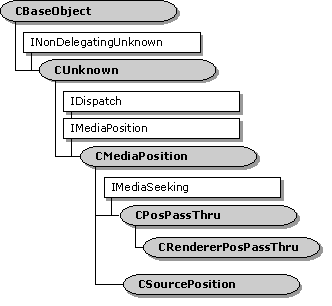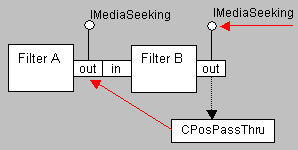
| Microsoft DirectX 8.1 (C++) |

The CPosPassThru class handles seek commands for filters with one input pin that do not perform seeking on their own.
This helper class implements the IMediaPosition and IMediaSeeking interfaces for filters that pass seek commands upstream. When the filter graph manager receives a seek command from an application, it delivers the command to the renderer filters in the graph. The command is then passed upstream through each filter's output pin, until it reaches a filter that can execute the command (if any). Typically, seeking is implemented on source filters or parser filters.
The CPosPassThru class holds a pointer to the filter's input pin. It passes seek commands to the connected output pin on the upstream filter, as shown in the following diagram.

Use the CPosPassThru class for transform filters, and the derived CRendererPosPassThru class for renderer filters.
To use this class in your filter, create an instance of the class and specify the filter's input pin in the CPosPassThru constructor method. Then delegate all IMediaPosition and IMediaSeeking calls to the CPosPassThru object.
The simplest way to delegate seeking commands is to expose the CPosPassThru object's IMediaPosition and IMediaSeeking interfaces. When your filter or pin is queried for one of these interfaces, return a pointer to the CPosPassThru implementation of the interface. The following code shows how do this. It is adapted from the CTransformOutputPin class. The CreatePosPassThru function is a helper function that creates the CPosPassThru object:
// The following member variables are assumed:
IPin *m_pInput; // Pointer to the input pin.
IUnknown *m_pPos; // Pointer to the CPosPassThru object.
STDMETHODIMP CMyPin::NonDelegatingQueryInterface(REFIID riid, void **ppv)
{
HRESULT hr
if (riid == IID_IMediaPosition || riid == IID_IMediaSeeking)
{
if (m_pPos == NULL)
{
hr = CreatePosPassThru(GetOwner(), FALSE, m_pInput, &m_pPos);
if (FAILED(hr)) return hr;
}
return m_pPos->QueryInterface(riid, ppv);
}
else
{
/* Return pointers to the other interfaces on this pin.... */
}
}
The CreatePosPassThru function leaves an outstanding reference count on the returned CPosPassThru object. Be sure to release it in your pin's destructor method:
~CMyPin::CMyPin()
{
if (m_pPos) m_pPos->Release();
}
Except where noted, all IMediaPosition and IMediaSeeking methods in this class call the corresponding method on the connected pin and return the result.
Requirements
Header: Declared in Ctlutil.h; include Streams.h.
Library: Use Strmbase.lib (retail builds) or Strmbasd.lib (debug builds).
| Public Methods | |
| CPosPassThru | Constructor method. |
| ForceRefresh | Obsolete. |
| GetMediaTime | Retrieves the time stamps on the current sample. Virtual. |
| IMediaPosition Methods | |
| get_Duration | Retrieves the duration of the stream. |
| put_CurrentPosition | Sets the current position, relative to the total duration of the stream. |
| get_StopTime | Retrieves the time at which the playback will stop, relative to the duration of the stream. |
| put_StopTime | Sets the time at which the playback will stop, relative to the duration of the stream. |
| get_PrerollTime | Retrieves the amount of data that will be queued before the start position. |
| put_PrerollTime | Sets the amount of data that will be queued before the start position. |
| get_Rate | Retrieves the playback rate. |
| put_Rate | Sets the playback rate. |
| get_CurrentPosition | Retrieves the current position, relative to the total duration of the stream. |
| CanSeekForward | Determines whether the stream can be seeked backward. |
| CanSeekBackward | Determines whether the stream can be seeked forward. |
| IMediaSeeking Methods | |
| CheckCapabilities | Queries whether a stream has specified seeking capabilities. |
| ConvertTimeFormat | Converts from one time format to another. |
| GetAvailable | Retrieves the range of times in which seeking is efficient. |
| GetCapabilities | Retrieves all the seeking capabilities of the stream. |
| GetCurrentPosition | Retrieves the current position, relative to the total duration of the stream. |
| GetDuration | Retrieves the duration of the stream. |
| GetPositions | Retrieves the current position and the stop position, relative to the total duration of the stream. |
| GetPreroll | Retrieves the amount of data that will be queued before the start position. |
| GetRate | Retrieves the playback rate. |
| GetStopPosition | Retrieves the time at which the playback will stop, relative to the duration of the stream. |
| GetTimeFormat | Retrieves the current time format. |
| IsFormatSupported | Determines whether a specified time format is supported. |
| IsUsingTimeFormat | Determines whether a specified time format is the format currently in use. |
| QueryPreferredFormat | Retrieves the preferred time format for the stream. |
| SetPositions | Sets the current position and the stop position. |
| SetRate | Sets the playback rate. |
| SetTimeFormat | Sets the time format. |
| Helper Functions | |
| CreatePosPassThru | Creates a CPosPassThru or CRendererPosPassThru object. |